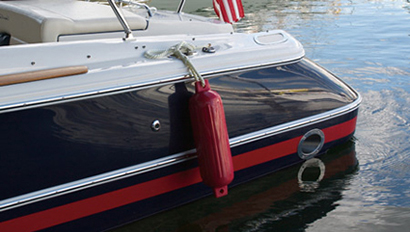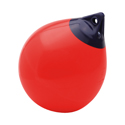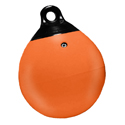

| Fender Series | Trailered Boats | Protected Moorings | Unprotected Moorings | Pilings | Rafting | Locks/ Concrete | |
|---|---|---|---|---|---|---|---|
|
|
|||||||

|
Polyform G | ✓ | ✓ | ✓ | |||

|
Taylor Made Hull Gard | ✓ | ✓ | ✓ | |||
|
|
|||||||

|
Taylor Made Big B | ✓ | ✓ | ✓ | ✓ | ✓ | |

|
Taylor Made Super Gard | ✓ | ✓ | ✓ | |||

|
Polyform HTM | ✓ | ✓ | ✓ | ✓ | ✓ | |
|
|
|||||||

|
Polyform A | ✓ | ✓ | ✓ | ✓ | ||

|
Taylor Made Tuff End Buoy | ✓ | ✓ | ✓ | ✓ | ||

|
Taylor Made Tuff End Fender | ✓ | ✓ | ✓ | ✓ | ||

|
Polyform F | ✓ | ✓ | ✓ | ✓ | ||
A general rule of thumb for choosing fender size:
| Polyform G Series Boat Fenders | |||||||
|---|---|---|---|---|---|---|---|

|
Model | G-1 | G-2 | G-3 | G-4 | G-5 | G-6 |
| Diameter | 3.5" | 4.5" | 5.5" | 6.5" | 8.8" | 11" | |
| Length | 12.8" | 15.5" | 19" | 22" | 26.8" | 30" | |
| Boat Length | Up to 10' | 10'-20' | 20'-30' | 30'-40' | |||
| Polyform F Series Boat Fenders | |||||||||||||
|---|---|---|---|---|---|---|---|---|---|---|---|---|---|

|
Model | F-1 | F-02 | F-2 | F-3 | F-4 | F-5 | F-6 | F-7 | F-8 | F-10 | F-11 | F-13 |
| Diameter | 6" | 7.5" | 8.2" | 8.2" | 8.5" | 11" | 11" | 15" | 15" | 18" | 21.2" | 29" | |
| Length | 24" | 26" | 25" | 30" | 40.5" | 30" | 42" | 41" | 48" | 50" | 57.5" | 76.5" | |
| Boat Length | 20'-30' | 30'-40' | 40'-50' | 50'-60' | 60'-70' | 70'+ | |||||||
| Polyform HTM Series Boat Fenders | |||||
|---|---|---|---|---|---|

|
Model | HTM-1 | HTM-2 | HTM-3 | HTM-4 |
| Diameter | 6.3" | 8.5" | 10.5" | 13.5" | |
| Length | 15.5" | 20.5" | 27" | 34.8" | |
| Boat Length | 20'-30' | 30'-40' | 40'-50' | ||
| Polyform A Series Buoys | ||||||||
|---|---|---|---|---|---|---|---|---|

|
Model | A-1 | A-2 | A-3 | A-4 | A-5 | A-6 | A-7 |
| Diameter | 11" | 14.5" | 17" | 20.5" | 27" | 34" | 39" | |
| Buoyancy | 29 lb | 68 lb | 121 lb | 187 lb | 396 lb | 792 lb | 1,345 lb | |
| Boat Length | 20'-30' | 30'-40' | 40'-50' | 50'-60' | 60'-70' | 70'+ | ||
| Taylor Made Hull Gard Boat Fenders | |||||||
|---|---|---|---|---|---|---|---|

|
Model | 3.5"x13" | 4.5"x16" | 5.5"x20" | 6.5"x23" | 8.5"x27" | 10.5"x30" |
| Diameter | 3.5" | 4.5" | 5.5" | 6.5" | 8.5" | 10.5" | |
| Length | 13" | 16" | 20" | 23" | 27" | 30" | |
| Boat Length | Up to 10' | 10'-15' | 15'-20' | 20'-25' | 25'-35' | 35'-50' | |
| Taylor Made Big B Boat Fenders | |||||
|---|---|---|---|---|---|

|
Model | 6"x15" | 8"x20" | 10"x26" | 12"x34" |
| Diameter | 6" | 8" | 10" | 12" | |
| Length | 15" | 20" | 26" | 34" | |
| Boat Length | 20'-25' | 25'-35' | 35'-50' | 50'-60' | |
| Taylor Made Super Gard Boat Fenders | |||||
|---|---|---|---|---|---|

|
Model | 5.5"x20" | 6.5"x22" | 8.5"x26" | 10.5"x30" |
| Diameter | 5.5" | 6.5" | 8.5" | 10.5" | |
| Length | 20" | 22" | 26" | 30" | |
| Boat Length | 15'-20' | 20'-25' | 25'-35' | 35'-50' | |
| Taylor Made Tuff End Boat Fenders | |||||||||
|---|---|---|---|---|---|---|---|---|---|

|
Model | 6"x25" | 8"x27" | 10"x30" | 12"x35" | 15"x41" | 19"x50" | 24"x57" | 32"x77" |
| Diameter | 6" | 8" | 10" | 12" | 15" | 19" | 24" | 32" | |
| Length | 25" | 27" | 30" | 35" | 41" | 50" | 57" | 77" | |
| Boat Length | Up to 30' | 25'-40' | 40'-50' | 50'-60' | 60'-70' | 70'-80' | 80'-100' | 100'+ | |
| Taylor Made Tuff End Buoys | ||||||||
|---|---|---|---|---|---|---|---|---|

|
Diameter | 9" | 12" | 15" | 18" | 21" | 27" | 34" |
| Buoyancy | 14 lb | 33 lb | 65 lb | 112 lb | 180 lb | 375 lb | 790 lb | |
| Boat Length | 10'-20' | 20'-30' | 30'-40' | 40'-50' | 50'-60' | 60'-70' | 70'+ | |
Any of the following can be used to inflate your boat fender or buoy:
This step-by-step video applies to the inflation of any brand of fender or buoy.
| Polyform Boat Fenders & Buoys | ||||
|---|---|---|---|---|
| Product | Max Circumference | Product | Max Circumference | |
| A-1 | 34.5" | F-1 | 18.8" | |
| A-2 | 45.5" | F-02 | 23.6" | |
| A-3 | 53.4" | F-2 | 25.7" | |
| A-4 | 64.4" | F-3 | 25.7" | |
| A-5 | 84.8" | F-4 | 26.7" | |
| A-6 | 106.8" | F-5 | 34.5" | |
| A-7 | 122.5" | F-6 | 34.5" | |
| G-1 | 11" | F-7 | 47.1" | |
| G-2 | 14.1" | F-8 | 47.1" | |
| G-3 | 17.3" | F-10 | 56.5" | |
| G-4 | 20.4" | F-11 | 66.6" | |
| G-5 | 27.6" | F-13 | 91.1" | |
| G-6 | 34.5" | HTM-1 | 19.8" | |
| Note: Recommended circumference values. Over-inflation may void warranty. | HTM-2 | 26.7" | ||
| HTM-3 | 33" | |||
| HTM-4 | 42.4" | |||
| Taylor Made Boat Fenders & Buoys | ||||
|---|---|---|---|---|
| Product | Max Circumference | Product | Max Circumference | |
| Hull Gard 3.5"x13" | 11" | Big B 6"x15" | 18.8" | |
| Hull Gard 4.5"x16" | 14.1" | Big B 8"x20" | 25.1" | |
| Hull Gard 5.5"x20" | 17.3" | Big B 10"x26" | 31.4" | |
| Hull Gard 6.5"x23" | 20.4" | Big B 12"x34" | 37.7" | |
| Hull Gard 8.5"x27" | 26.7" | Super Gard 5.5"x20" | 17.3" | |
| Hull Gard 10.5"x30" | 33" | Super Gard 6.5"x22" | 20.4" | |
| Tuff End Buoy 9" | 28" | Super Gard 8.5"x26" | 26.7" | |
| Tuff End Buoy 12" | 38" | Super Gard 10.5"x30" | 33" | |
| Tuff End Buoy 15" | 47" | Tuff End Fender 6"x25" | 18.8" | |
| Tuff End Buoy 18" | 57" | Tuff End Fender 8"x27" | 25.1" | |
| Tuff End Buoy 21" | 66" | Tuff End Fender 10"x30" | 31.4" | |
| Tuff End Buoy 27" | 85" | Tuff End Fender 12"x35" | 37.7" | |
| Tuff End Buoy 34" | 107" | Tuff End Fender 15"x41" | 47" | |
| Note: Recommended circumference values. Over-inflation may void warranty. | Tuff End Fender 19"x50" | 59.7" | ||
| Tuff End Fender 24"x57" | 75.4" | |||
| Tuff End Fender 32"x77" | 100.5" | |||


A good rule to go by is 1 fender for every 10’ of boat waterline length, but no less than 3 total.
When docking, place one fender at the beam (widest point) of your boat, and one both fore and aft. Space more fenders in between as boat length dictates.
When rafting, group 3 standard fenders at the beam and one larger fender both fore and aft. Place all of the fenders on the moored or anchored boat.

Hang your fenders from something solid like a stanchion base or deck cleat along the rail. Only tie them to lifelines as a last resort, as those are not as strong.
Position the fender low enough off the side of your boat so that its bottom end is an inch or two above the water.
Tie the fender line to your boat as close to the fender as possible, this helps to limit swinging.
Captain Dave with GetMyBoat shares some of his fender placement tips:


Vertical: This is typically the best choice for protection against flat surfaces like walls and floating docks.
Horizontal: Useful for protection against cylindrical objects like pilings, because of the wide surface area that is protected. It’s also a good idea to tie a fender horizontally at fixed (non-floating) docks.
Captain Dave with GetMyBoat teaches how to tie a slip hitch:
Here Captain Dave teaches how to tie a cleat hitch: